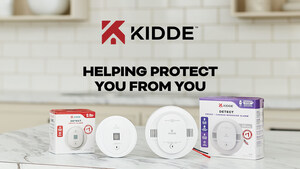PLYMOUTH, Mass., Nov. 12, 2013 /PRNewswire/ -- Eight years after the fatal carbon monoxide poisoning of 7-year-old Nicole Garofalo of Plymouth and the subsequent introduction of "Nicole's Law," which requires CO alarms in Massachusetts homes, a new survey finds many homes need to update their protection. Given these results and the fact that most CO poisonings occur during the winter, fire officials, state leaders and the experts at Kidde Fire Safety urge families to take the time now to install working CO alarms – and replace expired ones. Kidde is a leading manufacturer of residential fire safety products, a part of UTC Building & Industrial Systems, a unit of United Technologies Corp. (NYSE: UTX)
(Photo: http://photos.prnewswire.com/prnh/20131112/NE15289-a )
(Logo: http://photos.prnewswire.com/prnh/20131112/NE15289LOGO-b )
(Logo: http://photos.prnewswire.com/prnh/20130606/NE27992LOGO-b )
Despite the fact that Massachusetts law has required homeowners to install carbon monoxide alarms since 2005, a study conducted this fall by Qualtrics Research on behalf of Kidde found that 32 percent of respondents own a CO alarm that is outdated or no longer working. Another 25 percent do not have an alarm, yet 75 percent do have a source of carbon monoxide in their home.
According to the Centers for Disease Control, nearly 500 Americans die each year from accidental CO poisonings. Potential winter-related sources include furnaces, water heaters, fireplaces and generators. If devices malfunction or fail to ventilate properly, the odorless, colorless gas can build up inside the home, leading to injury or death.
CO alarms monitor the home 24 hours a day, seven days a week and are designed to provide accurate readings throughout the life of the unit. However, like all household appliances, CO alarms don't last forever. Alarms installed in 2005 now need to be replaced.
Underwriters Laboratories (UL), the independent third-party agency that tests CO alarms, requires an audible warning to alert a consumer when an alarm is expiring. Kidde CO alarms sound this end-of-life warning after seven years, while Kidde's new Worry-Free CO alarms are the first and only UL-listed models to last a decade. In addition to the longer life, the alarm contains a sealed-in lithium battery that also powers the alarm for 10 years, eliminating the need to replace a battery or hear a low-battery chirp for a decade.
"Kidde's Worry-Free alarms meet UL standards and offer hassle-free protection," said Chris Rovenstine, vice president, sales and marketing, Kidde. "Addressing the frustration caused by low-battery chirps may help reduce the number of poisonings that occur due to alarms with dead or missing batteries. Since smoke alarms also should be replaced every 10 years, having the same replacement time for your CO alarms makes it easier to remember."
Kidde CO alarms, including the Worry-Free alarms, are available throughout Massachusetts at home improvement and hardware retailers. For more information on CO alarms and the need for replacement, visit www.beatthebeep.com.
About Kidde
Kidde is a leading manufacturer of residential smoke alarms, carbon monoxide (CO) alarms, fire extinguishers, and has been delivering advanced fire safety technology for more than 90 years. Kidde is a business of UTC Building & Industrial Systems, and a business unit of United Technologies Corp. (NYSE: UTX), which provides high technology products and services to the building and aerospace industries worldwide. More information can be found at www.kidde.com.
SOURCE Kidde
WANT YOUR COMPANY'S NEWS FEATURED ON PRNEWSWIRE.COM?
Newsrooms &
Influencers
Digital Media
Outlets
Journalists
Opted In






Share this article